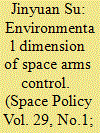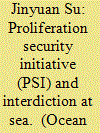| Srl | Item |
| 1 |
ID:
120657


|
|
|
|
|
| Publication |
2013.
|
| Summary/Abstract |
Current debates on the prevention of an arms race in outer space are dominated by the traditional perspective of international strategic balance. This article addresses the issue through the often-neglected lens of environmental protection, reviewing a number of environmental instruments as they relate to outer space. It argues that environmental protection, as a non-traditional element, is an instrumental impetus for arms control. The current regime leaves the door open for states to develop conventional orbital weapons and ground-based anti-satellite weapons (ASATs), which would have a significant adverse impact on the space environment. Thus the law of environmental protection is deficient in effectively protecting the space environment from pollution resulting from military activities. It is further argued that the space arms control regime should be strengthened for humanity's common interest in a sustainable space environment. Preferably an international treaty should be concluded to prohibit testing, deployment and use of space-based weapons and ASATs. These substantive obligations also conform to the requirements of safeguarding international peace and security, and the security interests of spacefaring countries.
|
|
|
|
|
|
|
|
|
|
|
|
|
|
|
|
| 2 |
ID:
096163


|
|
|
|
|
| Publication |
2010.
|
| Summary/Abstract |
Using the global commons for "peaceful purposes" is agreed upon among states in principle but disputed in substance. While non-militarization has been superceded by the doctrine of non-aggression, the latter, as a necessary rather than sufficient condition for "peaceful purposes", is tested to its limit by the pressing issue of space weaponization. An international treaty to plug the gaps of the Outer Space Treaty should be negotiated. This would require the prohibition of both weapons in outer space and anti-satellite weapons on Earth. The Draft Treaty on Prevention of the Placement of Weapons in Outer Space and of the Threat or Use of Force against Outer Space Objects, proposed by Russia and China at the Conference on Disarmament, is an effort in this direction. However, divided views are held on several issues arising from the draft treaty, e.g. the efficiency of the current regime of outer space law, definitions of "weapons in space" and "threat or use of force", and verification. A primary reason for US opposition to the draft treaty are security concerns over its space assets. However, exercising the right of self-defense is excluded from the obligations of disarmament and this is explicitly affirmed in the draft treaty.
|
|
|
|
|
|
|
|
|
|
|
|
|
|
|
|
| 3 |
ID:
110843


|
|
|
|
|
| Publication |
2012.
|
| Summary/Abstract |
The Proliferation Security Initiative has been surrounded by questions and criticisms pertaining to its legality since its inception. However, after nearly a decade of existence and development, it appears now that the actions conducted pursuant to the PSI have, by and large, been consistent with the principles of flag state jurisdiction, the nonuse of force, and sovereign equality and have not substantially impeded states' maritime rights in the territorial sea, contiguous zone, exclusive economic zone, or on the high seas.
|
|
|
|
|
|
|
|
|
|
|
|
|
|
|
|